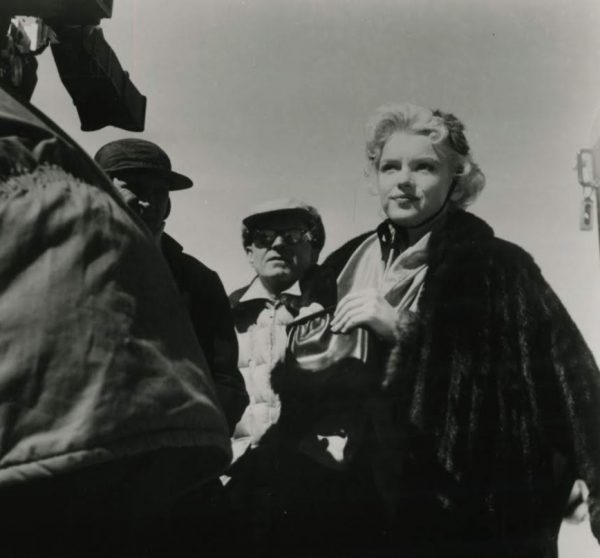
Bus Stop is one of my favourite Monroe films: an evocative character piece with an outstanding performance from Marilyn. However, many now find its gender politics – and Bo’s manhandling of Cherie – outdated and sexist. On the Culled Culture blog today, Genna Rivieccio considers why Bus Stop ‘didn’t do justice to how Marilyn Monroe fought to break free of the studio’s stereotype of her.’ (In her recent book, Some Kind of Mirror, Amanda Konkle takes a more positive view, noting that Cherie resists Bo’s advances until he learns to satisfy her desires.)
“Marilyn Monroe had spent months waiting out her unprecedented studio battle with 20th Century Fox. After fleeing to New York from Los Angeles like some sort of blonde haloed fugitive, Marilyn refused to ever turn back. To ever succumb to any of the dumb sexpot roles Darryl Zanuck wanted her to make in perpetuity. Yet the choice of ‘Chérie’–ultimately pronounced Cherry by the one who ‘wrangles’ her–in William Inge’s play, Bus Stop, didn’t seem to do much to distance herself from the image she so strongly claimed to detest. But maybe a part of her was terrified to shed it completely. For the thought of losing her adoring fans–the only source of true love in her life–was likely just as scary as forever being typecast. So it is that she went with the “just daring enough” role of Chérie … there is a meta tongue-in-cheek moment in which Chérie talks about her big plan to make it to Hollywood where ‘you get treated with a little respect.’ It’s an overt dig at Zanuck and 20th Century Fox (which Marilyn famously called 19th Century Fox for its backward treatment of female stars) …
Yet like Chérie, she can’t help but look to men for salvation. The two prototypes that would be her most tumultuous romances (and marriages), Joe DiMaggio and Arthur Miller, are both apparent in Beau. Outwardly, his rough-hewn tactlessness makes him a closer match to DiMaggio … Upon learning of her ‘sordid’ past (a.k.a. that she’s been with a few men to further accent the fact that Beau hasn’t–Miller, too, was rather virginal, having only ever been with his first wife before Marilyn), Beau finds the key to unlocking her heart by telling her, ‘Well, I’ve been thinkin’ about them other fellas, Cherry, and, well, what I mean is, I like you the way you are, so what do I care how you got that way?’ Miller told her pretty much the same thing, never chastising her the way DiMaggio did for parading her sexy persona, which is a primary reason why she fell in love with him …
Once again in this film (as in life), Monroe is a little girl lost, who is put back on the right path by a male savior. This was not a departure by any means from what she had done in the past with the studio, and made one wonder how the accolades came in so readily for a movie such as this, when past roles in Clash By Night, Don’t Bother to Knock and Niagara provided her far more opportunity for dramatic range.
Bus Stop is still billed as somewhere in between a comedy and drama, though it very much falls into an almost screwball comedy genre (for that’s kind of how one has to look at a movie so overtly dripping with misogyny and the suppression of the female will). Marilyn would only make four more movies after this, among them being one of the most praised of her career, Some Like It Hot (with another two, The Prince and the Showgirl and Let’s Make Love, being largely panned), a film in which, you guessed it, Marilyn relies on the comedic sex symbol shtick that launched her into the spotlight in the first place.”